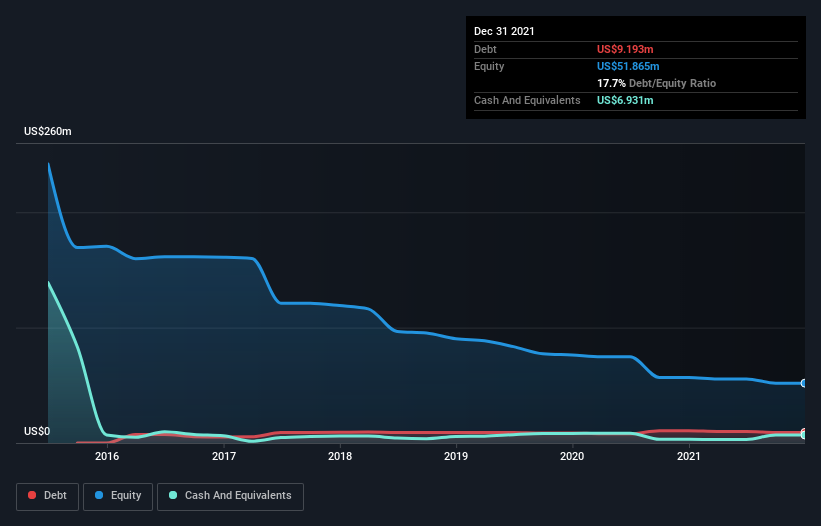Howard Marks put it nicely when he said that, rather than worrying about share price volatility, 'The possibility of permanent loss is the risk I worry about... and every practical investor I know worries about.' So it seems the smart money knows that debt - which is usually involved in bankruptcies - is a very important factor, when you assess how risky a company is. Importantly, CH Offshore Ltd. (SGX:C13) does carry debt. But should shareholders be worried about its use of debt?
Why Does Debt Bring Risk?
Debt assists a business until the business has trouble paying it off, either with new capital or with free cash flow. If things get really bad, the lenders can take control of the business. However, a more usual (but still expensive) situation is where a company must dilute shareholders at a cheap share price simply to get debt under control. By replacing dilution, though, debt can be an extremely good tool for businesses that need capital to invest in growth at high rates of return. When we examine debt levels, we first consider both cash and debt levels, together.
See our latest analysis for CH Offshore
How Much Debt Does CH Offshore Carry?
As you can see below, CH Offshore had US$9.19m of debt at December 2021, down from US$10.6m a year prior. On the flip side, it has US$6.93m in cash leading to net debt of about US$2.26m.

How Strong Is CH Offshore's Balance Sheet?
According to the last reported balance sheet, CH Offshore had liabilities of US$11.1m due within 12 months, and liabilities of US$5.62m due beyond 12 months. Offsetting these obligations, it had cash of US$6.93m as well as receivables valued at US$11.4m due within 12 months. So it can boast US$1.54m more liquid assets than total liabilities.
This surplus suggests that CH Offshore has a conservative balance sheet, and could probably eliminate its debt without much difficulty. When analysing debt levels, the balance sheet is the obvious place to start. But you can't view debt in total isolation; since CH Offshore will need earnings to service that debt. So if you're keen to discover more about its earnings, it might be worth checking out this graph of its long term earnings trend.
Over 12 months, CH Offshore made a loss at the EBIT level, and saw its revenue drop to US$16m, which is a fall of 18%. We would much prefer see growth.
Caveat Emptor
While CH Offshore's falling revenue is about as heartwarming as a wet blanket, arguably its earnings before interest and tax (EBIT) loss is even less appealing. Indeed, it lost a very considerable US$3.7m at the EBIT level. Looking on the brighter side, the business has adequate liquid assets, which give it time to grow and develop before its debt becomes a near-term issue. But we'd want to see some positive free cashflow before spending much time on trying to understand the stock. This one is a bit too risky for our liking. The balance sheet is clearly the area to focus on when you are analysing debt. However, not all investment risk resides within the balance sheet - far from it. Be aware that CH Offshore is showing 2 warning signs in our investment analysis , and 1 of those is concerning...
If, after all that, you're more interested in a fast growing company with a rock-solid balance sheet, then check out our list of net cash growth stocks without delay.
New: AI Stock Screener & Alerts
Our new AI Stock Screener scans the market every day to uncover opportunities.
• Dividend Powerhouses (3%+ Yield)
• Undervalued Small Caps with Insider Buying
• High growth Tech and AI Companies
Or build your own from over 50 metrics.
Have feedback on this article? Concerned about the content? Get in touch with us directly. Alternatively, email editorial-team (at) simplywallst.com.
This article by Simply Wall St is general in nature. We provide commentary based on historical data and analyst forecasts only using an unbiased methodology and our articles are not intended to be financial advice. It does not constitute a recommendation to buy or sell any stock, and does not take account of your objectives, or your financial situation. We aim to bring you long-term focused analysis driven by fundamental data. Note that our analysis may not factor in the latest price-sensitive company announcements or qualitative material. Simply Wall St has no position in any stocks mentioned.
About SGX:C13
CH Offshore
An investment holding company, owns and charters vessels in Singapore, Malaysia, Indonesia, Mexico, Africa, India, and Brunei.
Flawless balance sheet with acceptable track record.
Market Insights
Community Narratives



